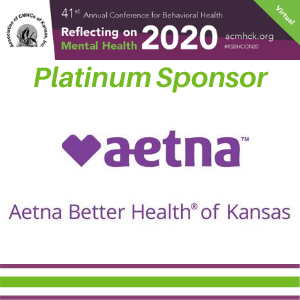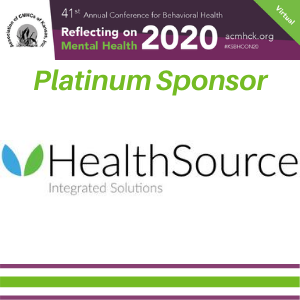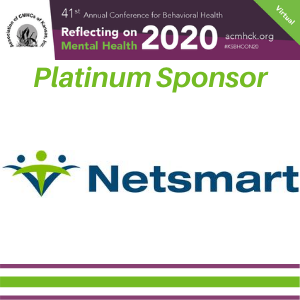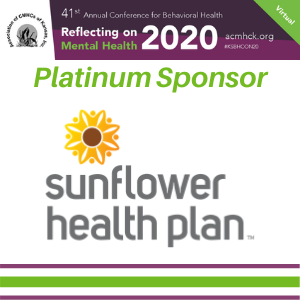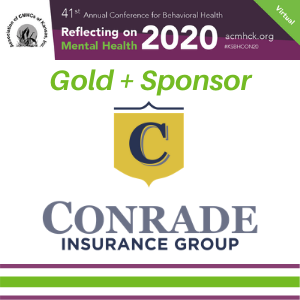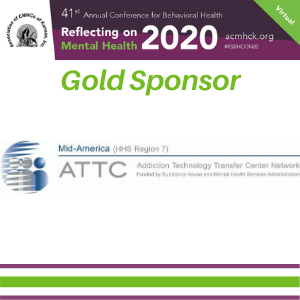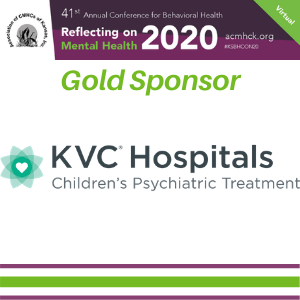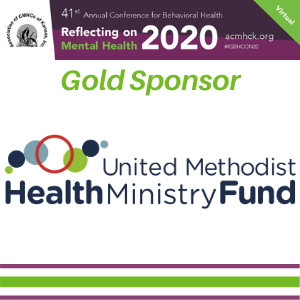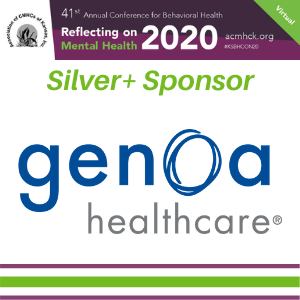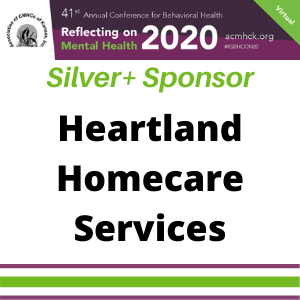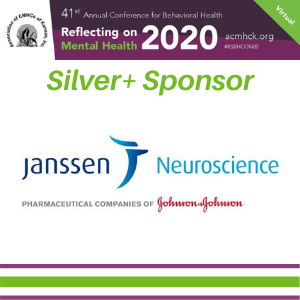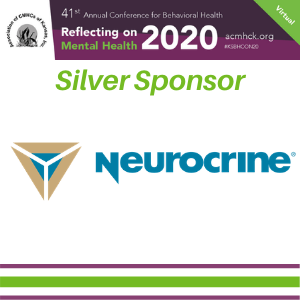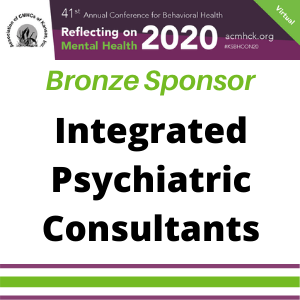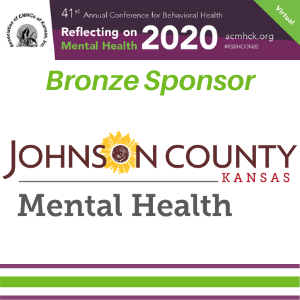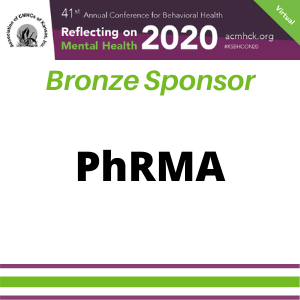The 41st Annual Conference is being held virtually September 15-18, 2020.
The Annual Conference for Behavioral Health is presented by the Association of Community Mental Health Centers of Kansas in partnership with the Kansas Association of Addiction Professionals
and Kansas Association for Infant &
Early Childhood Mental Health.
The conference provides educational opportunities to increase awareness of emerging trends, build skills and knowledge to provide behavioral health care,
and advocate for policy change.
Thank you to our 2020
Annual Conference Sponsors
Preconference, September 15: $50
Full Conference, September 16-18: $200
Single Day, September 16 or 17: $100
Single Day, September 18: $50
There will be 17-20 CMEs available at our conference this year.
KEYNOTE SPEAKERS

Chuck Ingoglia
President and CEO-National Council for Behavioral Health
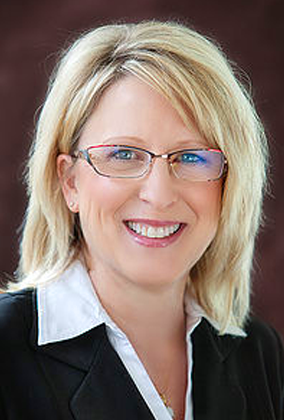
Kathleen Harnish McKune
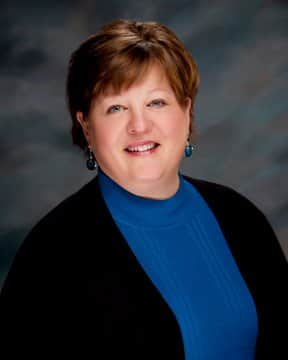
Karen Dickson

Sharon Borde
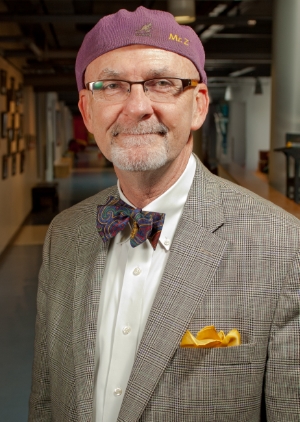
Steve Zwolak
With more than 20 years of experience in behavioral health, Charles Ingoglia has worked as a provider, advocate, and educator for government and public sector organizations. Prior to becoming President and CEO of the National Council for Behavioral Health, he served as the Senior VP of Public Policy and Practice Improvement. He also serves as adjunct faculty at the George Washington University Graduate School of Political Management.
Kathleen is CEO and co-founder of TeamTech, a Kansas City-based strategic consulting firm. Kathleen has over 25 years of experience facilitating non-profits, local governments and community groups. She received her MBA from the University of Kansas and her BBA from Pittsburg State University, Pittsburg, Kansas.
Karen Dickson works as an IT recruiter and is a practicing Reiki master. Karen spent several years volunteering as an EMT in rural WI and working in the emergency room as an ER tech. She encountered individuals who were in traumatic life situations (physical and emotional) and felt called to learn more about the neuroscience of trauma. She studied Nursing at MATC in Madison WI. Her dream is to open a multi-disciplinary facility to help others heal from past traumas.
Sharon Borde has worked in IT recruitment for over 30 years and she plans to spend retirement helping children with dyslexia, volunteering at the local schools, painting, and writing the novel that’s been in her head for years! She plans to engage with her sisters to work on a documentary about incest in hopes of bringing attention to the issues, and to help others heal and thrive. Sharon earned her BA in English and History from Pittsburg State University; Pittsburg, Kansas.
Steve Zwolak is the CEO of LUME Institute and Executive Director of University City Children’s Center. He has almost 40 years of experience working in early childhood. Recently Mr. Zwolak has been recognized for leading the conversation on the impact and future of early childhood education in St. Louis. His years as a classroom teacher, a leader in various educational arenas, and a student of children have enabled him to build an approach to education for which there is preliminary evidence of closing the racial and socioeconomic achievement gap. His approach brings together theoretical, observational, and neuroscientific research that emphasizes that the emotional development of children is critical to future success.
SCHEDULE AT A GLANCE
- Tuesday, September 15, 2020
- Wednesday, September 16, 2020
- Thursday, September 17, 2020
- Friday, September 18, 2020
ACMHCK Preconference on Early Childhood Mental Health
10:00-11:00 Opening Session: Remarks by Steve Zwolack-Who am I? And who am I in the lives of children?
How do we hold the hearts and souls of so many of our heartbroken children and families? To answer this question, we must explore our “WHY”—why do we do what we do? Understanding our “WHY” allows us to connect with children and families so we know WHAT they need, and HOW to engage them. We will explore five essentials necessary to understand when working in the early childhood space as we braid early childhood education and mental health to enhance childhood and family wellness and transform society by changing the way young children are taught.
11:00-12:00 Session: Introduction to Infant Mental Health
Presenters: Lana Messner, M.S.Ed., IMH-E®, Infant Mental Health Mentor, & Tammie Wallin, MS, Co-Chairs, KAIMH Endorsement Committee
12:00-1:00 Lunch Break
1:00-2:00 Session: Orientation to the KAIMH Infant Mental Health Endorsement
Presenter: Beth Blubaugh, LCMFT, IMH-E®, Infant Family Specialist, KAIMH Association Coordinator
2:00-3:00 Session: Specialized Training
Presenters: Lana Messner, M.S.Ed., IMH-E®, Infant Mental Health Mentor, & Tammie Wallin, MS, Co-Chairs, KAIMH Endorsement Committee
3:00-3:15 Break
3:15-4:15 Session: Reflective Supervision
Presenter: Rick Gaskill, Ed.D., IMH-E®, Infant Mental Health Mentor
4:15-4:30 Wrap-Up and Questions will be conducted by all presenters.
| 8:15-8:45 | Welcome/Intro | Kyle Kessler |
| 8:45-10:00 | Remarkably Resilient After first writing our stories in our book, Remarkably Resilient: Community Matters, we three sisters are now speaking out to share our journeys of surviving, eventually thriving, and ultimately breaking the multi-generational cycle of incest and abuse in our paternal family. Though we shared a common household, our three paths from hurting to healing to helping are uniquely different. Our stories pull from the neuroscience of trauma and resilience as we reflect on how we broke this abusive cycle. We ground insights from the neuroscience of trauma when sharing the long-term effects of our childhood trauma as well as the key roles several members of our small western Kansas community played in helping us be resilient. We weave together research, insights, and stories with personal reflections and suggestions on the role communities and their members can play in the healing process. |
Kathleen Harnish McKune, Karen Dickson, Sharon Borde |
| 10:00-10:15 | Break | |
| 10:15-11:15 | Integrated Care and Alternate Payment Models in a Pandemic You are not alone in navigating this pandemic and the complexities of alternate payment models. This presentation highlights many of the success’s that are achieved with statewide data and information sharing, and why many states that are not part of the CCBHC pilot are exploring opportunities to implement the CCBHC initiative via Medicaid waivers or state plan amendments. The recent COVID-19 pandemic provided opportunities to accelerate different delivery models, and with a measurement process already in place, to closely watch the impact on clients and finances. |
Julie Hiett |
| 10:15-11:15 | Working with Children and Families Recovering through the Trauma of a Pandemic – We will explore the impact of the sudden separation…a severing of the relationship between child and teachers, teachers and families, and teachers and the school. How do/did we get teachers, families and children physically, emotionally and socially prepared for the ReUnion. | Steve Zwolak |
| 10:15-11:15 | Gaming Disorder: The Gamer, and the Game This presentation will review the latest information about video gaming and especially the rapid growth during the COVID-19 crisis. The goal is to give an overview of the Gaming Disorder and a brief look at the effects of gaming for those who develop a problem. Treatment and prevention will also be reviewed |
Wiley Harwell |
| 10:15-11:15 | Cross-Sector Partnerships: How Communities Can Prioritize Behavioral Health in Community Health Assessments This session aims to build a foundation of understanding for community mental health center leaders interested in community health assessment and planning. The session will address the “what, why, and how” of community health assessments, including the partners, processes, and plans typically involved. The session will also discuss considerations and opportunities for community mental health centers, such as:
|
Dr. Sarah Jolley and Ty Kane |
| 11:15-11:30 | Break | |
| 11:30-12:30 | Special Lunch-n-Learn presented by Platinum Sponsor, Netsmart A Comprehensive Statewide or County Technology Strategy When individuals receive treatment and services across multiple care settings, gaps can occur. Join us to discuss how to bridge those gaps while also improving care delivery and outcomes. We will discuss the realities of creating an integrated whole person care view with actionable data. |
Carol Reynolds |
| 12:30-12:45 | Break | |
| 12:45-1:45 | SPQM: Data Management at the CMHC and the Association level This workshop will examine the basics of SPQM to ensure data integrity at the CMHC and Association levels. The workshop will also review how to use the data and reports within SPQM to manage an agency and at the ACMHCK. This workshop will be beneficial to persons wanting both a more fundamental understanding of SPQM and a better understanding in how to use the data and reports within SPQM. |
Mike Garrett |
| 12:45-1:45 | Organizational Trauma Due to Covid-19 Much has happened in the last six months requiring organizations to pivot and adapt, often in the middle of other changes happening simultaneously. The impact of such swift change can be experienced as traumatic by staff and those who supervise them. This session will acknowledge leadership challenges faced in the context of COVID, identify loss and stress felt by staff, identify organizational strategies to address times of crisis and support resilience and identify actions that can lead to a stronger, more resilient organization. |
Teresa Cornejo Strausz and Janell Stang |
| 12:45-1:45 | Confidentiality of SUD Treatment Records: What You Need to Know Substance Use Disorder (SUD) treatment is regulated by specific federal confidentiality laws—42 CFR Part 2 and HIPAA. It is critical that any practitioner in SUD treatment understands these regulations and how they apply in real world situations. This interactive session covers the basics of both regulations, along with updates related to changes made in 2020. |
Dulcinea Rakestraw |
| 12:45-1:45 | Trauma and Resilience Working with trauma survivors can cause experiences of vicarious trauma. This training will differentiate between burnout and vicarious trauma. In this workshop you will learn warning signs of vicarious trauma, low- and high-level impact of vicarious trauma, and strategies to mitigate vicarious trauma. |
Kelly Young and Kathleen Harnish McKune |
| 1:45-2:00 | Break | |
| 2:00-2:45 | Virtual Exhibit Hall During this time, conference attendees will have the opportunity to connect with conference sponsors and exhibitors. |
|
| 2:45-3:00 | Break | |
| 3:00-4:00 | Incorporating Peer Support Professionals into the Continuum of Treatment Services Providing services to people who have experienced trauma often requires a range of supportive services. Peer support has been shown to have many benefits that help promote resilience and recovery for those served. This presentation will equip clinical providers with options and resources to help incorporate peer support as an effective component in the continuum of treatment services. |
Ellen Walker |
| 3:00-4:00 | Local Government Panel As the local mental health authorities, Community Mental Health Centers are an important part of healthcare delivery at the county level. In this session, a panel of local government officials will discuss their role in supporting mental health service delivery in their communities. |
Becky Fast, Johnson County Commissioner, TBD |
| 3:00-4:00 | Human Trafficking: Reaching Out and Supporting Survivors In this workshop we will look at the issue of human sex trafficking from a survivor’s perspective. Deb will discuss how the Homestead navigates survivors through the recovery process and onto a path of self-sufficiency, and this will be done with a Homestead graduate who will also share about her journey, her life change process, and what benefited her in the Homestead Program. |
Deb Kluttz |
| 3:00-4:00 | Vicarious Trauma Working with trauma survivors can cause experiences of vicarious trauma. This training will differentiate between burnout and vicarious trauma. In this workshop you will learn warning signs of vicarious trauma, low- and high-level impact of vicarious trauma, and strategies to mitigate vicarious trauma. |
Kelly Young |
| 4:00-4:30 | Awards Presentation and Closing Remarks | Kyle Kessler |
| 8:30-9:00 | Welcome | Secretary Laura Howard |
| 9:00-10:00 | National Perspective: Updates from National Council The outbreak of the novel coronavirus, and the public health response to contain it, have caused numerous challenges and opportunities related to the delivery of mental health and addiction treatment. This session will provide an overview from a national perspective and reflect on trends that will continue to influence the delivery of care for the foreseeable future. The session will focus on 1.Understanding the major federal policy changes that have occurred related to the delivery of mental health and substance use treatment |
Chuck Ingoglia |
| 10:00-10:15 | Break | |
| 10:15-11:15 | 2020 Legislative Recap and 2021 Forecast | Kyle Kessler |
| 10:15-11:15 | The Kansas Tobacco Guideline for Behavioral Health Care: Lessons Learned from Providers A panel presentation will be offered reflecting the work of 11 CMHCs and 1 addiction provider who have been participating in a mini-grant program supported by NAMI Kansas and the Kansas Health Foundation focused on the Kansas Tobacco Guideline for Behavioral Health Care. An overview of the work plans for all of the grantees will be provided with four grantees being featured to provide in-depth detail and to discuss how similar efforts might be replicated in other organizations. The importance of addressing tobacco use in the behavioral health population will be placed in the context of the current COVID-19 pandemic. |
Rick Cagan, Rachel Bieker, Jamie Katz, Emily Biondo, and Kelsi Strickland |
| 10:15-11:15 | Peer Support Recruitment and Retention Peer Support is a crucial and effective component in the continuum of treatment services. Recruiting and retaining qualified peer specialists (youth, adult behavioral health, and family) may require different strategies from those traditionally utilized with other positions. This session will highlight such potential strategies, resources, and barriers that affect successful recruitment and retention of this specialized group of professionals. |
Bailey Blair and William Reilly |
| 10:15-11:15 | Panel Discussion on Mental Health Intervention (MHIT) Program The Mental Health Intervention Program was created to provide mental health treatment and track the behavioral health needs of youth. The program is carried out through partnerships between community mental health centers and school districts at the local level and is designed to deliver behavioral health services to students within the school setting. As we look back on the second full year of the program, panelists will discuss lessons learned, student outcomes, and future plans. |
Lori Marshall, Keith Rickard, Jennie Watson, Misti Mustain, and Diane Gjerstad
|
| 11:15-11:30 | Break | |
| 11:30-12:30 | Special Lunch-n-Learn presented by Platinum Sponsor | Platinum Sponsor |
| 12:30-12:45 | Break | |
| 12:45-1:45 | Timely Topics in Healthcare Policy | Kyle Kessler, Kim Nelson, and Panelists |
| 12:45-1:45 | Diversity and Inclusion In this session, we will facilitate an open dialogue about the importance of Diversity and Inclusion and its implication in the workplace, client care and agency outcomes. |
Dereck Dean and Alicia Guerro-Chavez |
| 12:45-1:45 | Implementing Peer Support in Behavioral Health Services This session is a panel presentation of Kansas Certified Peer Mentors and Kansas Certified Peer Specialists who have been working in SUD and Mental Health to share their experience of the work they do. They will provide examples of the use of peer services in different programs across the system that are proving successful to establish and maintain recovery. The desired outcome of this panel is to promote the recognition of the use of peer services as a valuable part of the continuum of treatment and recovery services in the Kansas behavioral health care system. |
Panelists TBD |
| 12:45-1:45 | Validating and Managing the Natural Fear Response Fear is often a natural response in times of uncertainty. Recognizing and identifying these fears, how they look different in individuals, and understanding how past trauma effects our reactions is important as we move forward through this time as a society. Finding the tools needed to better navigate fear and anxiety allows us to proceed in a more trauma-informed manner, creating more stability and calm in our communities and organizations. |
LeeAnne Mullen |
| 1:45-2:00 | Break | |
| 2:00-3:00 | Medication Prior Authorization Process: The Good, Bad & the Ugly This session will highlight things staff (psychiatrists, psychiatric nurse practitioners, and nursing staff) at community mental health centers need to be aware of as they take their clients thru the prior authorization process for psychotropic medications. |
Dr. Vishal Adma |
| 2:00-3:00 | Trauma-Informed Organizations Trauma and stress are largely impactful for many individuals in the mental health community. In recent months, the effects of the pandemic and the movement for social justice reform have also impacted individuals’ mental and physical health. As providers of mental health services, the impact of trauma on an individual must be taken into account, not only at the clinical level but also in the broader environment in which we provide those services. This talk will serve the purpose of introducing you to the steps and environmental changes your organization needs to become a trauma informed organization, including the key elements of the trauma informed model of care. We will explore facilities changes, system-wide initiatives, cultural competence, consumer voice, recovery, and relationships. |
Dr. Abby Callis and Dereck Dean |
| 2:00-3:00 | SOAR: The Link to Recovery Your Agency Might Be Missing This session will focus on how the SOAR program benefits clients, your agency, and your community. Specific focus will be on the SOAR Medicaid process in Kansas and SSA applicants; how SOAR supports individuals’ recovery and return to work; and how SOAR connects to HUD Housing and Residential programs. |
Tamara Hurley, Jonathan Pendergrass, and Robyn Nienstedt-Whitaker |
| 2:00-3:00 | Cross-Sector Partnerships to Address Priority Community Behavioral Health Issues This session will highlight current cross-sector partnerships in Kansas that are working to address priority behavioral health issues. Panelists from northwest Kansas will describe their collaborative efforts to address mental health concerns created by trauma and stress, including a series of regional mental health forums and virtual resilience workshops. Panelists from Manhattan will describe the Community Care Team that works to align community services to meet client needs including those to address mental health and substance abuse, unstable housing, and transportation needs. |
Ty Kane, Debbie Nuss, Travis Rickford, Krystal Lantz, Dave Anderson |
| 3:00-3:15 | Break | |
| 3:15-4:15 | The Nuts and Bolts of SB123 The intent of the SB 123 program is to ensure public safety while effectively addressing prison recidivism by providing community-based substance abuse treatment to targeted, nonviolent drug offenders having substance abuse disorders. This session will review key elements of the Kansas SB123 Program, describe how it is relevant to the work of behavioral health providers, and provide time for Q&A. |
Kira Johnson |
| 3:15-4:15 | #ZeroReasonsWhy: How a Teen-led Campaign Is Empowering Students #ZeroReasonsWhy is a teen-led storytelling and community mobilization campaign with the goal of removing the stigma around teen suicide and mental wellness. This segment will highlight the impetus for the campaign, its structure, the outcomes recognized after two years, and next steps for the campaign. At the conclusion of this segment, participants will understand: |
Caleb Nelson, Kira Fuchs, Jeff Short, Tim DeWeese |
| 3:15-4:15 | Intranasal Esketamine (Spravato): From Research to Practice: Why and How to Do I This presentation will discuss: 1. Who are appropriate patients for intranasal esketamine? 2. What is the evidence that it works and is safe? 3. Why treat such patients?—Because you can change their lives and yours. 4. What are the practical hurdles to consider to make it feasible? 5. What to do if it does not work? |
Dr. Sheldon Preskorn |
| 3:15-4:15 | Risk Management: What Behavioral Health Providers Need to Know Demand for behavioral health services is currently at an all-time high, which means clinicians are providing unprecedented levels of care to meet the needs of patients. An increase in patient needs may also mean an increase in liability, if you fail to adhere to the general recommendations of risk management. This webinar will identify risk issues and trends many practitioners are experiencing in the behavioral health arena and offer some practical guidance to minimize liability. |
Yolanda Sims |
| 8:00-8:30 |
Early Warning Signs: How COVID-19 Is Sending Shockwaves Through American Life and Children’s Mental Health As COVID-19 continues to spread through the Nation, its negative impacts to our communities are stacking up and becoming debilitating for many people—physically and mentally. People are losing loves ones, jobs, housing, school, childcare, social stimulation, access to healthcare services, and many more necessary supports. Even once there’s a vaccine and the pandemic is considered controlled, we will be battling to overcome the long lasting effects on people’s trauma exposure and mental health. And our youngest generations are at the greatest risk. The stats are shocking—and we share them in this presentation along with strategies you can take to help the children and families you serve improve their resiliency to the pandemic’s affects and develop skills to overcome the hardships it brings. |
Annmarie Arensberg, Sara Schlagel, and Fred Watts |
| 8:30-8:45 | Break | |
| 8:45-10:15 | Ethics | Dr. Dave Barnum |
| 8:45-10:15 | MHFA Trainer Summit The MHFA Trainers Summit will include updates from the National Council on Behavioral Health and provide a unique opportunity for trainers across Kansas to network and engage in group discussions of emerging hot topics, such as teen MHFA, how to adapt trainings to allow for social distancing, virtual options, and best practices. |
Tramaine El-Amin, Lori Marshall, Monica Simpson, Julia Gaughan, and Jamie Katz |
| 8:45-10:15 | Civic Capacity and the Coronavirus Those who study how communities work know why some respond better than others to disruptions like the coronavirus: They are more resilient because they have greater civic capacity. The COVID-19 pandemic offers an opportunity to enhance the civic capacity of this country’s communities and regions reclaiming the vital role of civic life in shaping this country’s future. In 2019 and 2020, we convened a panel of 34 experts from the United States and Canada to help develop our understanding of community-driven change and civic capacity. With the help of this panel, we: • Created a broader conceptual understanding of community-driven change and civic capacity; • Defined the civic capacities communities need to respond to challenges and disruptions and what these capacities look like in practice; • Developed a diagnostic tool, the Civic Capacity Index (CCI), a measure of a community’s ability to make progress on complex, adaptive civic challenges. The CCI helps inform, shape, and evaluate intervention strategies from governments, foundations, and other civic actors. With the help of the community-driven change framework, civic actors can take advantage of existing civic capacity, understand where it is lacking, and build resilience for the future. |
Joyce McEwen Crane and David Chrislip |
| 8:45-10:15 | Training Session: So, you’ve finished your online SOAR course. Now what? This training session will focus on navigating the complex systems of SSA, Kansas Medicaid, and using the OAT tracking software after you have received your SOAR certificate. In addition, presentations will include • What SSA needs for your case • How SOAR can work in tandem with SSA Work Incentive programs • Distinguishing between Re-Connect SOAR cases and New File SOAR cases • Assisting consumers exiting state hospitals or correctional facilities • How SOAR connects to HUD Housing and Residential programs |
Tamara Hurley, Jonathan Pendergrass, and Robyn Nienstedt-Whitaker |
| 10:15-10:30 | Break | |
| 10:30-12:00 | Ethics, Cont. | Dr. Dave Barnum |
| 10:30-12:00 | MHFA Trainer Summit, Cont’d The MHFA Trainers Summit will include updates from the National Council on Behavioral Health and provide a unique opportunity for trainers across Kansas to network and engage in group discussions of emerging hot topics, such as teen MHFA, how to adapt trainings to allow for social distancing, virtual options, and best practices. |
Tramaine El-Amin, Lori Marshall, Monica Simpson, Julia Gaughan, and Jamie Katz |
| 10:30-11:30 | Sponsored Session | Sponsor Aetna |
| 10:30-12:00 | Training Session: So, you’ve finished your online SOAR course. Now what?, cont’d This training session will focus on navigating the complex systems of SSA, Kansas Medicaid, and using the OAT tracking software after you have received your SOAR certificate. In addition, presentations will include • What SSA needs for your case • How SOAR can work in tandem with SSA Work Incentive programs • Distinguishing between Re-Connect SOAR cases and New File SOAR cases • Assisting consumers exiting state hospitals or correctional facilities • How SOAR connects to HUD Housing and Residential programs |
Tamara Hurley, Jonathan Pendergrass, and Robyn Nienstedt-Whitaker
|

